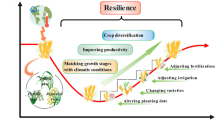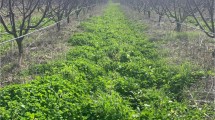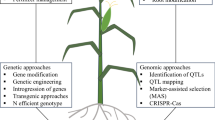Abstract
Background and aims
Sustainable crop production is crucial to address global food security and requires a solid input of chemical fertilizers containing macro (e.g. nitrogen: N) and micro (e.g. zinc: Zn) nutrients. However, climatic factors beyond farmers’ management capabilities determine the final crop yields, and world’s climate has been changing more rapidly than ever due to human activities such as industrialization and deforestation. This study evaluates the interactive effects of predicted climate change and N and Zn supply on performance of bread wheat as a model staple food crop.
Methods
Bread wheat (T. aestivum cv. Ceyhan-99) was cultivated in soil fertilized with adequate or low N and Zn in pots under ambient climate (ambient CO2 and temperature) or predicted climate (700 μmol mol−1 CO2 and 3 °C temperature rise) conditions in dedicated plant growth chambers. Plants were harvested at full maturity and grain yield, and yield attributes along with Zn and N status of grains were determined.
Results
Predicted climate (PC) treatment significantly accelerated plant growth rate resulting in early onset of successive growth stages and maturity. In both PC and ambient climate (AC) conditions, adequate supply of N and Zn significantly increased straw and grain yield by increasing number of spikes per plant and number of grains per spike, whereas PC significantly reduced straw and grain yield through reducing number of spikes per plant, particularly in plants supplied with adequate N. Effect of adequate Zn or PC treatments were significant only under adequate N supply. Adequate N not only increased grain protein concentration but also grain Zn, particularly under adequate Zn application. In general, PC tended to increase grain Zn concentration, but the effect was non-significant. PC had no effect on grain protein concentration, whereas it significantly reduced grain protein yield (i.e. total mass of protein in whole grains of a single plant).
Conclusion
The future climate with elevated CO2 and raised temperature can dramatically reduce duration of time to complete successive growth stages in wheat. Plants cultured under PC conditions had significantly lower straw and grain yield, although supplied with ample fertilization. Whereas the PC and adequate Zn treatments enhanced main spike gain yield and number of grains per spike, PC declined overall grain yield, particularly due to severe reduction in number of spikes per plant. We conclude that sustaining a higher number of spikes per plant along with adequate nutrition with N and Zn are key factors to benefit from an elevated CO2 atmosphere and to minimize adverse effects of rising temperatures on wheat yield and quality.







Similar content being viewed by others
References
Alloway BJ (2008) Zinc in soils and crop nutrition, 2nd edn. International zinc association, Brussels; international fertilizer industry association, Paris
Asif M, Yilmaz O, Ozturk L (2017) Elevated carbon dioxide ameliorates the effect of Zn deficiency and terminal drought on wheat grain yield but compromises nutritional quality. Plant Soil 411:57–67. https://doi.org/10.1007/s11104-016-2996-9
Asseng S, Ewert F, Martre P et al (2015) Rising temperatures reduce global wheat production. Nat Clim Chang 5:143–147. https://doi.org/10.1038/nclimate2470
Bagci SA, Ekiz H, Yilmaz A, Cakmak I (2007) Effects of zinc deficiency and drought on grain yield of field-grown wheat cultivars in Central Anatolia. J Agron Crop Sci 193:198–206. https://doi.org/10.1111/j.1439-037X.2007.00256.x
Bell MA, Fischer RA, Byerlee D, Sayre K (1995) Genetic and agronomic contributions to yield gains: a case study for wheat. Field Crop Res 44:55–65. https://doi.org/10.1016/0378-4290(95)00049-6
Brennan RF (1992) The effect of zinc fertilizer on take-all and the grain yield of wheat grown on zinc-deficient soils of the Esperance region, Western Australia. Fert Res 31:215–219. https://doi.org/10.1007/BF01063295
Broadley M, Brown P, Cakmak I et al (2012) Function of nutrients: micronutrients. In: Marschner P (ed) Marschner’s mineral nutrition of higher plants, Third edn. Academic press, London, pp 191–248
Cakmak I (2000) Possible roles of zinc in protecting plant cells from damage by reactive oxygen species. New Phytol 146:185–205. https://doi.org/10.2307/2588965
Cakmak I (2008) Enrichment of cereal grains with zinc: agronomic or genetic biofortification? Plant Soil 302:1–17. https://doi.org/10.1007/s11104-007-9466-3
Cakmak I, Pfeiffer WH, McClafferty B (2010) Biofortification of durum wheat with zinc and iron. Cereal Chem 87:10–20
Cassman KG, Bryant DC, Fulton AE, Jackson LF (1992) Nitrogen supply effects on partitioning of dry matter and nitrogen to grain of irrigated wheat. Crop Sci 32:1251. https://doi.org/10.2135/cropsci1992.0011183X003200050038x
Caviglia OP, Sadras VO (2001) Effect of nitrogen supply on crop conductance, water- and radiation-use efficiency of wheat. Field Crop Res 69:259–266. https://doi.org/10.1016/S0378-4290(00)00149-0
Delgado E, Mitchell R, PARRY MAJ et al (1994) Interacting effects of CO2 concentration, temperature and nitrogen supply on the photosynthesis and composition of winter wheat leaves. Plant Cell Environ 17:1205–1213. https://doi.org/10.1111/j.1365-3040.1994.tb02018.x
Dias de Oliveira E, Bramley H, Siddique KHM et al (2013) Can elevated CO2 combined with high temperature ameliorate the effect of terminal drought in wheat? Funct Plant Biol 40:160. https://doi.org/10.1071/FP12206
Dreccer MF, Schapendonk AHCM, Slafer GA, Rabbinge R (2000) Comparative response of wheat and oilseed rape to nitrogen supply: absorption and utilisation efficiency of radiation and nitrogen during the reproductive stages determining yield. Plant Soil 220:189–205. https://doi.org/10.1023/A:1004757124939
Duval BD, Blankinship JC, Dijkstra P, Hungate BA (2012) CO2 effects on plant nutrient concentration depend on plant functional group and available nitrogen: a meta-analysis. Plant Ecol 213:505–521. https://doi.org/10.1007/s11258-011-9998-8
Erenoglu EB, Kutman UB, Ceylan Y et al (2011) Improved nitrogen nutrition enhances root uptake, root-to-shoot translocation and remobilization of zinc (65Zn) in wheat. New Phytol 189:438–448. https://doi.org/10.1111/j.1469-8137.2010.03488.x
Evans LT (1978) The influence of irradiance before and after anthesis on grain yield and its components in microcrops of wheat grown in a constant daylength and temperature regime. Field Crop Res 1:5–19. https://doi.org/10.1016/0378-4290(78)90003-5
FAO, IFAD and WFP (2014) The state of food insecurity in the world 2014. Strengthening the enabling environment for food security and nutrition. Rome, FAO
FAOSTAT (2011) Food and agriculture Organization of the United Nations, Satistics division. In: Stat. data base. http://faostat.fao.org/. Accessed 10 March 2018
Högy P, Fangmeier A (2008) Effects of elevated atmospheric CO2 on grain quality of wheat. J Cereal Sci 48:580–591. https://doi.org/10.1016/j.jcs.2008.01.006
Högy P, Wieser H, Köhler P et al (2009) Does elevated atmospheric CO2 allow for sufficient wheat grain quality in the future? J Appl Bot Food Qual 82:114–121
IPCC (2013) Climate change 2013: the physical science basis. In: Stocker TF, Qin D, Plattner GK et al (eds) Contribution of working group I to the fifth assessment report of the intergovernmental panel on climate change. Cambridge University Press, Cambridge, 1535 pp
Jan A, Wasim M, Amanullah A (2013) Interactive effects of zinc and nitrogen application on wheat growth and grain yield. J Plant Nutr 36:1506–1520. https://doi.org/10.1080/01904167.2013.799181
Kim H, Lieffering M, Kobayashi K et al (2003) Effects of free-air CO2 enrichment and nitrogen supply on the yield of temperate paddy rice crops. Field Crop Res 83:261–270. https://doi.org/10.1016/S0378-4290(03)00076-5
Kutman UB, Yildiz B, Ozturk L, Cakmak I (2010) Biofortification of durum wheat with zinc through soil and foliar applications of nitrogen. Cereal Chem 87:1–9
Kutman UB, Yildiz B, Cakmak I (2011) Improved nitrogen status enhances zinc and iron concentrations both in the whole grain and the endosperm fraction of wheat. J Cereal Sci 53:118–125
Leakey ADB, Ainsworth EA, Bernacchi CJ et al (2009) Elevated CO2 effects on plant carbon, nitrogen, and water relations: six important lessons from FACE. J Exp Bot 60:2859–2876. https://doi.org/10.1093/jxb/erp096
Li F, Kang S, Zhang J, Cohen S (2003) Effects of atmospheric CO2 enrichment, water status and applied nitrogen on water- and nitrogen-use efficiencies of wheat. Plant Soil 279–289
López-Bellido RJ, López-Bellido L (2001) Efficiency of nitrogen in wheat under Mediterranean conditions: effect of tillage, crop rotation and N fertilization. Field Crop Res 71:31–46. https://doi.org/10.1016/S0378-4290(01)00146-0
Ma D, Sun D, Wang C et al (2017) Physiological responses and yield of wheat plants in zinc-mediated alleviation of drought stress. Front Plant Sci 8:860. https://doi.org/10.3389/fpls.2017.00860
Makino A (2011) Photosynthesis, grain yield, and nitrogen utilization in rice and wheat. Plant Physiol 155:125–129. https://doi.org/10.1104/pp.110.165076
Martínez-Carrasco R, Pérez P, Morcuende R (2005) Interactive effects of elevated CO2, temperature and nitrogen on photosynthesis of wheat grown under temperature gradient tunnels. Environ Exp Bot 54:49–59. https://doi.org/10.1016/j.envexpbot.2004.05.004
Mitchell RAC, Mitchell VJ, Driscoll SP et al (1993) Effects of increased CO2 concentration and temperature on growth and yield of winter wheat at two levels of nitrogen application. Plant Cell Environ 16:521–529. https://doi.org/10.1111/j.1365-3040.1993.tb00899.x
Mosse J (1990) Nitrogen-to-protein conversion factor for ten cereals and six legumes or oilseeds. A reappraisal of its definition and determination. Variation according to species and. J Agr Food Chem 18–24. https://doi.org/10.1021/jf00091a004, 38
Myers SS, Zanobetti A, Kloog I et al (2014) Increasing CO2 threatens human nutrition. Nature 510:139–142. https://doi.org/10.1038/nature13179
Nie Z, Zhao P, Wang J et al (2017) Absorption kinetics and subcellular fractionation of zinc in winter wheat in response to nitrogen supply. Front Plant Sci 8:1435
Otteson BN, Mergoum M, Ransom JK (2007) Seeding rate and nitrogen management effects on spring wheat yield and yield components. Agron J 99:1615. https://doi.org/10.2134/agronj2007.0002
Pal M, Rao LS, Jain V et al (2005) Effects of elevated CO2 and nitrogen on wheat growth and photosynthesis. Biol Plant 49:467–470
Rawson HM (1986) High-temperature-tolerant wheat: a description of variation and a search for some limitations to productivity. Field Crop Res 14:197–212. https://doi.org/10.1016/0378-4290(86)90058-4
Rehman A, Farooq M, Ozturk L et al (2017) Zinc nutrition in wheat-based cropping systems. Plant Soil 422:283–315. https://doi.org/10.1007/s11104-017-3507-3
Reich PB, Hobbie SE, Lee T et al (2006) Nitrogen limitation constrains sustainability of ecosystem response to CO2. Nature 440:922–925. https://doi.org/10.1038/nature04486
Salvagiotti F, Miralles DJ (2008) Radiation interception, biomass production and grain yield as affected by the interaction of nitrogen and sulfur fertilization in wheat. Eur J Agron 28:282–290. https://doi.org/10.1016/j.eja.2007.08.002
Shiferaw B, Smale M, Braun H-J et al (2013) Crops that feed the world 10. Past successes and future challenges to the role played by wheat in global food security. Food Secur 5:291–317. https://doi.org/10.1007/s12571-013-0263-y
Wang L, Feng Z, Schjoerring JK (2013) Effects of elevated atmospheric CO2 on physiology and yield of wheat (Triticum aestivum L.): a meta-analytic test of current hypotheses. Agric Ecosyst Environ 178:57–63. https://doi.org/10.1016/j.agee.2013.06.013
Wardlaw IF, Dawson IA, Munibi P, Fewster R (1989) The tolerance of wheat to high temperatures during reproductive growth. I. Survey procedures and general response patterns. Aust J Agric Res 40:1–13. https://doi.org/10.1071/AR9890001
Zhang Y, Chen X, Zhang C et al (2014) Availability of soil nitrogen and phosphorus under elevated [CO2] and temperature in the Taihu Lake region, China. J Plant Nutr Soil Sci 177:343–348
Acknowledgements
The authors thank to Assist. Prof. Jennifer Lachowiec of Montana State University, USA for valuable comments and proof-reading of the manuscript.
Author information
Authors and Affiliations
Corresponding author
Additional information
Responsible Editor: Jan Kofod Schjoerring.
Rights and permissions
About this article
Cite this article
Asif, M., Tunc, C.E., Yazici, M.A. et al. Effect of predicted climate change on growth and yield performance of wheat under varied nitrogen and zinc supply. Plant Soil 434, 231–244 (2019). https://doi.org/10.1007/s11104-018-3808-1
Received:
Accepted:
Published:
Issue Date:
DOI: https://doi.org/10.1007/s11104-018-3808-1




